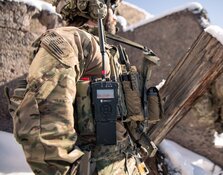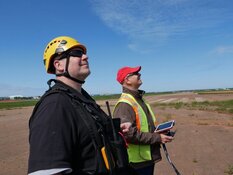If you're unfamiliar with Volatus Aerospace Corp. (VOL:TSX; VLTTF:OTCQB), all you need to know is that the company provides integrated drone solutions throughout North America and worldwide. It primarily serves civic and public safety markets, with some defense work, providing contracted imaging and inspection, security, and surveillance, as well as equipment sales and support.
The company handles research and development, design, and manufacturing in Canada, developing the drones that its subsidiary, Volatus Aviation, uses to provide greener, drone-based solutions to supplement and replace traditional aircraft and helicopters for long-linear civil infrastructure inspections such as those required by pipeline, energy, rail, and cargo services.
Volatus Aerospace's professional network of 1,200 certified contract pilots stretches across North America, providing coast-to-coast drone product access for existing industries and new use cases.
Companies deploying Volatus' solutions operate in many industries, including construction and engineering, infrastructure and telecom, property development and maintenance, environmental forestry wildlife conservation, municipal operations, survey, landfill, and gravel, among many other small niches.
The Catalyst: Great Q3 2023 Numbers
On November 27, the company issued its Q3 financial results, offering numbers supporting its claim that it operates at the forefront of civil drone deployment.
Specifically, Volatus Aerospace generated revenues of CA$8,274,349 for the three months ending Sept 30, 2023, with a 36% gross margin and adjusted EBITDA improvement of CA$961,874 from (CA$1,417,437) in Q3 2022 to (CA$455,563) in Q3 2023.
The company's overall revenue increased by 44% from CA$5,763,869 in Q3 2022 to CA$8,274,349 in Q3 2023 after adjusting for a one-time aircraft sale in Q3 2022.
More importantly, service revenue (from what the company calls its “Aerial Intelligence and Data Segment”) for Q3 2023 increased by 349%, from CA$1,112,678 in Q3 2022 to CA$4,991,856 in Q3 2023. As this segment is crucial to the company's long-term plans, 3.5x growth represents much actual work done to expand the customer base.
The company also reported an estimated unfulfilled demand exceeding CA$10 million in potential equipment sales hamstrung due to working capital constraints.
Gross profit for Q3 2023 roughly doubled, from CA$1,541,542 to CA$3,008,574, again excluding the one-time aircraft sale in Q3 2022. The increase in gross profit was primarily due to higher gross margins from the service segment mentioned above.
Despite all this pressure to degrade supply, the drone market is poised to grow from US$ 26.2 billion in 2022 to US$ 38.3 billion by 2027, according to a report by Markets and Markets.
The company reported gross margins for the quarter of 36%, up 6% over the third quarter of 2022, with margin performance exceeding expectations thanks to higher service revenue. If equipment sales increase in the coming quarters, gross margins will likely shrink back toward the 30% target.
Available working capital at the time of reporting was CA$4,687,918, with the company estimating a similar level of working capital in the next few quarters as the EBITDA drain is reduced. Ultimately, Volatus Aerospace recorded a comprehensive loss of (CA$1,920,403) in Q3 2023 compared to (CA$2,458,211) in Q2 2023, a 22% reduction year-over-year, with a continued trend of reducing losses quarter-over-quarter.
With an estimated order book of CA$80 million, the company expects to generate CA$10 million in revenue in Q1 2024, representing a growth of 35% compared to Q1 2023, with gross profit exceeding CA$3.3M and 2% in adjusted EBITDA. In addition, Volatus completed a cost optimization program in Q3 2023 and has confirmed annualized cost savings of CA$3 million, with the full impact of these measures becoming apparent in Q4 2023.
"We view this contract positively where it signifies the company's strategic move into a larger market, building on its expertise and capabilities in the oil and gas industry," Echelon Capital Markets analyst Rob Goff wrote.
According to Volatus Aerospace CEO Glen Lynch, the company's "Q3 results demonstrate partially our recent efforts to achieve near-term profitability and that we're on track for immediate and long-term efficiencies across all our business lines."
"Our team has successfully landed long-term recurring contracts across utility and oil and gas segments that are due to start in 2024,” he continues, “which support direct and recurring contribution on our EBITDA as we achieve economies of scale and full-scale asset utilization."
Over Q3 2023, Volatus continued its plan to penetrate more significant, more lucrative, and longer-term power utility markets, expanding into the US and winning an additional contract with a value of up to CA$60 million. It also successfully entered the U.S. oil and gas pipeline surveillance market by contracting with a leading energy company for CA$4 million worth of work set to begin.
Why This Industry? Demand for Friendly Drones
While it's already widely understood that drones are changing the face of modern warfare, far less thought (and fewer lines of reportage) have gone into how drones are changing various aspects of the civic sphere. Drones provide a greener, safer solution by replacing expensive, highly polluting pilot-bearing craft for aerial observation tasks.
However, whether a drone is armed isn't the only bar by which one can judge its friendliness. Where it's built and by whom are also essential to the equation. The stark truth of this reality is explained in a recent story about how the U.S. government intends to source drones for its fleets of the future.
In November, Reuters reported that Republican Rep. Mike Gallagher and Democratic Rep. Raja Krishnamoorthi introduced the "American Security Drone Act" in the U.S. House of Representatives.
"This bill would prohibit the federal government from using American taxpayer dollars to purchase this equipment from countries like China," Gallagher said.
The U.S. Senate also separately approved an amendment by Sen. Marsha Blackburn and Sen. Mark Warner that would stop the Federal Aviation Administration from operating or providing federal funds for drones from China, Russia, Iran, North Korea, Venezuela, or Cuba.
"Taxpayer dollars should never fund drones manufactured in regions that are hostile toward our nation," Blackburn said.
Even as early as 2019, congress banned the Pentagon from buying or using drones made in China. In 2020, the Commerce Department put export restrictions on Chinese drone manufacturer DJI, which builds over 50% of the drones sold in the U.S.
Despite all this pressure to degrade supply, the drone market is poised to grow from US$ 26.2 billion in 2022 to US$ 38.3 billion by 2027, according to a report by Markets and Markets.
The upshot of these intersecting forces is that the U.S. is making itself a prime market for drones produced in friendly jurisdictions like Europe, Australia, and Canada, where Volatus Aerospace and its non-military drone solutions are based.
"In 2023, we'll inspect over 10,000 T&D structures for various utility clients," says Volatus Aerospace COO Rob Walker. "Starting January 2024, we will add work on the West Coast and anticipate inspecting upward of 25,000 structures in North America, more than doubling this year's volume."
Why This Company? Entering US Market
In a September 11 research report, Echelon Capital Markets analyst Rob Goff was bullish after Volatus landed its first contract with a large, unnamed, U.S.-based energy company for CA$4 million.
"We view this contract positively where it signifies the company's strategic move into a larger market, building on its expertise and capabilities in the oil and gas industry," Goff wrote.
He explained how energy companies and oil and gas pipeline users employ drones to monitor their infrastructure for safety and regulatory compliance. Based on the news of that contract, Echelon reiterated its Speculative Buy rating and CA$0.75 per share target price. The company was trading at CA$0.22, suggesting a potential return of 241%.
The analyst noted that this contract was a powerful entrance into a vast U.S. network encompassing some 4.2 million kilometers of pipeline, five times the size of the network in Canada. He added that long-line inspection contracts are typically three to five years, and the likelihood of renewal is high. "The recurring nature of the business warrants a premium against equipment sales," he explained.
Why Now? Growing Customer Base, Right Tech for the Job
We reported further on Volatus on September 19 as more details regarding its contract to begin operations in oil and gas pipeline surveillance in the U.S. emerged. At the time, CEO Lynch commented that the company's "experience and expertise put [it] in a strong position to capture a market opportunity that is expected to grow to US$1.1 billion by 2033."
Lynch cited the company's unique Aerial Information Reporting System and its incorporation of other cutting-edge technology, such as artificial intelligence, as the keystone of its inevitable dominance in this niche civil aviation market. He also explained that to further its efforts in pipeline surveillance, Volatus has entered into a contract with Flyscan Systems Inc. to install new technology on its drones.
Flyscan provides a "state-of-the-art hyperspectral sensor pod and software-enabled automated airborne gas leak [detector]," allowing Volatus' drones to detect evidence of pipeline breaches with greater accuracy than any human observer can offer.
According to Ben Ruszkowski, COO of Volatus Aerospace subsidiary Synergy Aviation, "With this partnership, Volatus will be advancing toward the next generation of autonomous pipeline surveillance, making the unseen seen. The challenges we face today, such as safety and environmental concerns, can be solved with the introduction of automated remote sensing and machine learning/AI-enhanced capabilities, which we are uniquely qualified to offer with our partner Flyscan."
 Streetwise Ownership Overview*
Streetwise Ownership Overview*
Volatus Aerospace Corp. (VOL:TSX; VLTTF:OTCQB)
Ownership and Share Structure
Reuters provided a breakdown of the company's ownership and share structure, where management and insiders own approximately 63.04% of the company.
According to Reuters, Chairman Ian Alexander McDougall owns 31.75% of the company with 39.02 million shares, and President and CEO Glen Lynch owns 31.29% of the company with 38.46 million shares.
Reuters reports that institutions own approximately 0.49% of the company in the form of Palos Management with 0.60 million shares.
The company has a market cap of CA$30 million. It has 113,943,079 outstanding shares, 24,954,951 warrants, and 5,599,232 options for a fully diluted base of 144,497,262 shares.
Two sets of warrants expire on December 22, 2023, with a third set expiring on October 5, 2024.
| Want to be the first to know about interesting Special Situations and Technology investment ideas? Sign up to receive the FREE Streetwise Reports' newsletter. | Subscribe |
Important Disclosures:
- As of the date of this article, officers and/or employees of Streetwise Reports LLC (including members of their household) own securities of [Volatus Aerospace].
- [Owen Ferguson] wrote this article for Streetwise Reports LLC and provides services to Streetwise Reports as an independent contractor.
- The article does not constitute investment advice. Each reader is encouraged to consult with his or her individual financial professional and any action a reader takes as a result of information presented here is his or her own responsibility. By opening this page, each reader accepts and agrees to Streetwise Reports' terms of use and full legal disclaimer. This article is not a solicitation for investment. Streetwise Reports does not render general or specific investment advice and the information on Streetwise Reports should not be considered a recommendation to buy or sell any security. Streetwise Reports does not endorse or recommend the business, products, services or securities of any company mentioned on Streetwise Reports.
For additional disclosures, please click here.




































